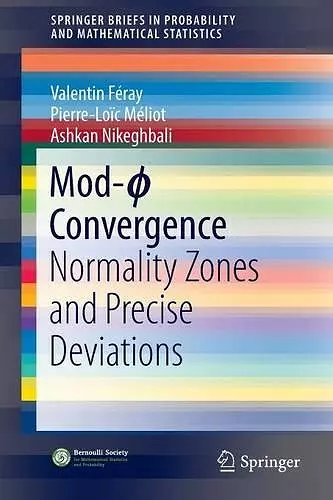Mod-ϕ Convergence
Normality Zones and Precise Deviations
Valentin Féray author Pierre-Loic Meliot author Ashkan Nikeghbali author
Format:Paperback
Publisher:Springer International Publishing AG
Published:16th Dec '16
Should be back in stock very soon

The canonical way to establish the central limit theorem for i.i.d. random variables is to use characteristic functions and Lévy’s continuity theorem. This monograph focuses on this characteristic function approach and presents a renormalization theory called mod-ϕ convergence. This type of convergence is a relatively new concept with many deep ramifications, and has not previously been published in a single accessible volume. The authors construct an extremely flexible framework using this concept in order to study limit theorems and large deviations for a number of probabilistic models related to classical probability, combinatorics, non-commutative random variables, as well as geometric and number-theoretical objects. Intended for researchers in probability theory, the text is carefully well-written and well-structured, containing a great amount of detail and interesting examples.
“The book is well written and mathematically rigorous. They authors collect a large variety of results and try to parallel the theory with applications and they do this rather successfully. It may become a standard reference for researchers working on the topic of central limit theorems and large deviation. … this is a useful book for a researcher in probability theory and mathematical statistics. It is very carefully written and collects many new results.” (Nikolai N. Leonenko, zbMATH 1387.60003, 2018)
“This beautiful book (together with other publications by these authors) opens a new way of proving limit theorems in probability theory and related areas such as probabilistic number theory, combinatorics, and statistical mechanics. It will be useful to researchers in these and many other areas.” (Zakhar Kabluchko, Mathematical Reviews, September, 2017)
ISBN: 9783319468211
Dimensions: unknown
Weight: unknown
152 pages
1st ed. 2016